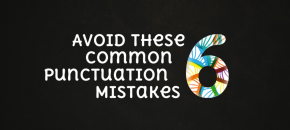Common English Grammar Mistakes
We have covered a lot of grammar topics on this blog over the past few years as a means to support English language learning, and we thought it was time to round up some of the most common English grammar mistakes that people make. Find out how to avoid these common mistakes, and try some exercises to practice what you've learned.
Since and For – Use “since” to indicate the beginning of a time period until the present. Use “for” when you’re talking about an amount of time – how long something happens. Get a better idea by reading more about these two similar words.
Whether or If – "Whether" and "if" are both used to express a condition, but they are used for different purposes. Read on for some examples and a deeper explanation.

They're, There and Their – These three words are commonly confused, even though they all have very different functions. Find out what makes these homophones different and tips on how to tell them apart.
Affect and Effect – Affect and effect are both used to express the result of an action. Effect is used as a noun, whereas affect is used as a verb. Get some examples of these words in use and practice your knowledge.
It's and Its – These are probably the two most commonly confused words, and autocorrect and other phone dictionaries don't help! While it's is a contraction of "it is", its expresses ownership. Get some more tips on this pair and compare their uses.

What other sets of words do you find confusing? Share them in the comments and we will help explain them to you!




